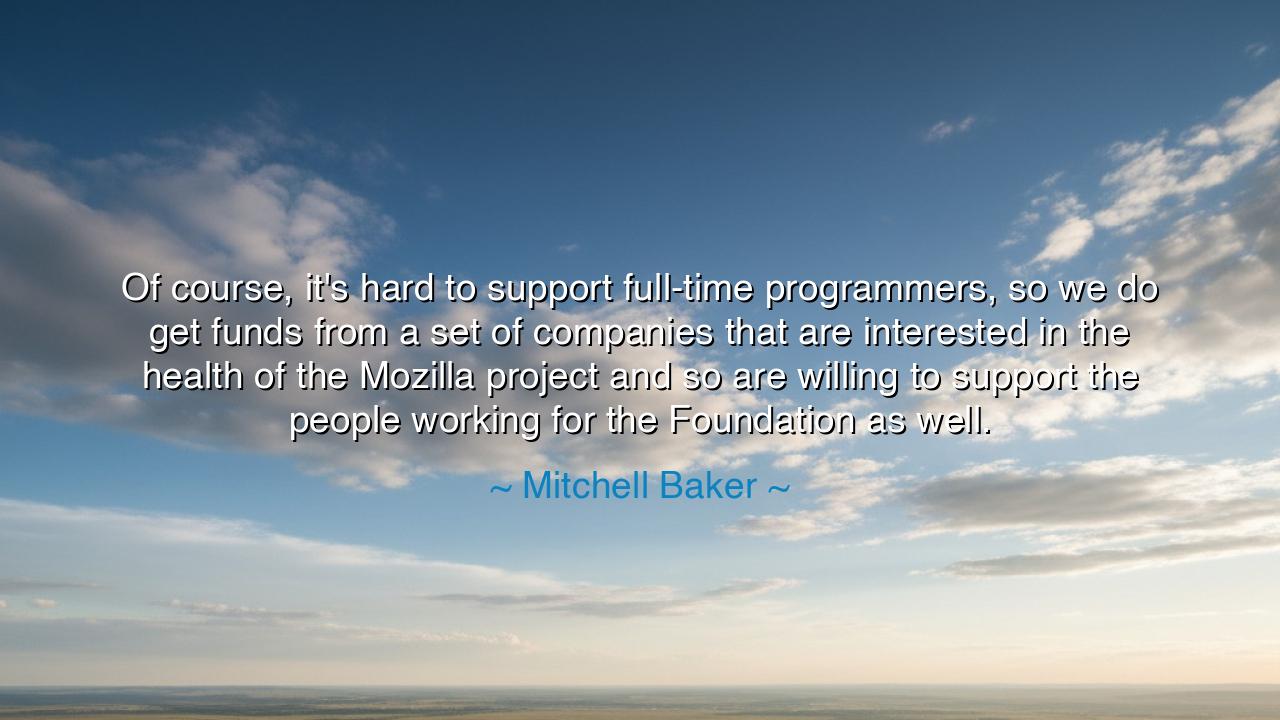
Of course, it's hard to support full-time programmers, so we do
Of course, it's hard to support full-time programmers, so we do get funds from a set of companies that are interested in the health of the Mozilla project and so are willing to support the people working for the Foundation as well.






In the calm and reasoned words of Mitchell Baker, a pioneer of the digital age, we hear not only a statement about technology but a timeless meditation on cooperation and shared purpose: “Of course, it’s hard to support full-time programmers, so we do get funds from a set of companies that are interested in the health of the Mozilla project and so are willing to support the people working for the Foundation as well.” Beneath these pragmatic words lies a vision both ancient and eternal — that the strength of a community depends not on isolation, but on collaboration; that progress is not built by one, but by many whose efforts are bound by a common dream.
Mitchell Baker, often called the “Chief Lizard Wrangler,” was among the founders of the Mozilla Foundation, born from the ashes of the old Netscape to carry forward the flame of open-source innovation — a world where code, like wisdom, is shared freely for the good of all. Her words speak to the reality that even noble ideals must be sustained by the material world. “It’s hard to support full-time programmers,” she says — and in this, she reminds us of an ancient truth: that even the brightest flame needs oil to burn. Those who build the tools of knowledge require sustenance, and those who benefit from them have a sacred duty to give back.
In the Mozilla project, one finds a living embodiment of the spirit of cooperation — a brotherhood of creators who, like the philosophers of old, labor not for gold or glory, but for the advancement of humanity’s collective knowledge. Yet even such a cause cannot exist in a void. Baker acknowledges that companies — the great engines of the modern world — have stepped forward to contribute, not for profit alone, but out of recognition that a healthy, open internet is a treasure for all. Thus, the health of the Mozilla project becomes a metaphor for the health of civilization itself: sustained by the balance of idealism and pragmatism, of vision and support.
The ancients knew this balance well. In Athens, Pericles declared that a city’s greatness lay not in the wealth of a few but in the shared strength of its citizens. In the great monasteries of medieval Europe, scholars who preserved the wisdom of the past were sustained by the gifts of patrons who understood that knowledge itself was sacred. Likewise, in our own age, those who contribute to the open web become modern patrons of enlightenment — sustaining not temples of stone, but temples of code and collaboration, where truth and creativity flow freely.
Baker’s words remind us that the pursuit of great ideals always requires partnership. The Foundation, in her description, is not merely an organization; it is a vessel for human purpose. The companies that offer support are like merchants who bring grain to a city in winter — they keep the spirit of innovation alive through their generosity. And in this exchange — between the makers of code and the providers of resources — lies a symbiosis, as natural as that between sunlight and seed. For no idea, however pure, can flourish without the means to sustain it, and no wealth, however vast, can endure without the innovation that propels the world forward.
There is also a deeper wisdom here — that community is the true foundation of progress. The Mozilla project thrives because it is built on trust, transparency, and a shared belief in the public good. In this, it mirrors the ancient academies, where knowledge was offered freely to those who sought it, and where learning itself was a public service. Baker’s message is clear: when we give our support to endeavors that serve humanity rather than hoard power, we participate in the eternal cycle of creation — we become, in our small way, guardians of the flame.
Let the lesson be this: support that which uplifts and enlightens, for in doing so, you ensure that the light continues to shine. The coder who writes for the common good, the patron who gives without seeking praise, the company that sustains a cause greater than profit — all are part of the same noble lineage. Just as the builders of cathedrals once labored for centuries to erect monuments of faith, so too do the builders of open systems labor to erect monuments of freedom — structures of code that uphold the very architecture of knowledge and communication.
And so, my children of the digital age, remember Mitchell Baker’s wisdom: even the grandest visions need hands to hold them, hearts to sustain them, and allies to believe in them. If you wish to build a better world — in technology, in art, or in spirit — do not work alone. Seek those who share your purpose, and give your strength to those whose work serves the greater good. For in unity lies resilience, and in shared courage, creation. Thus, the health of the whole becomes the victory of all, and the dream of one becomes the destiny of many.






AAdministratorAdministrator
Welcome, honored guests. Please leave a comment, we will respond soon